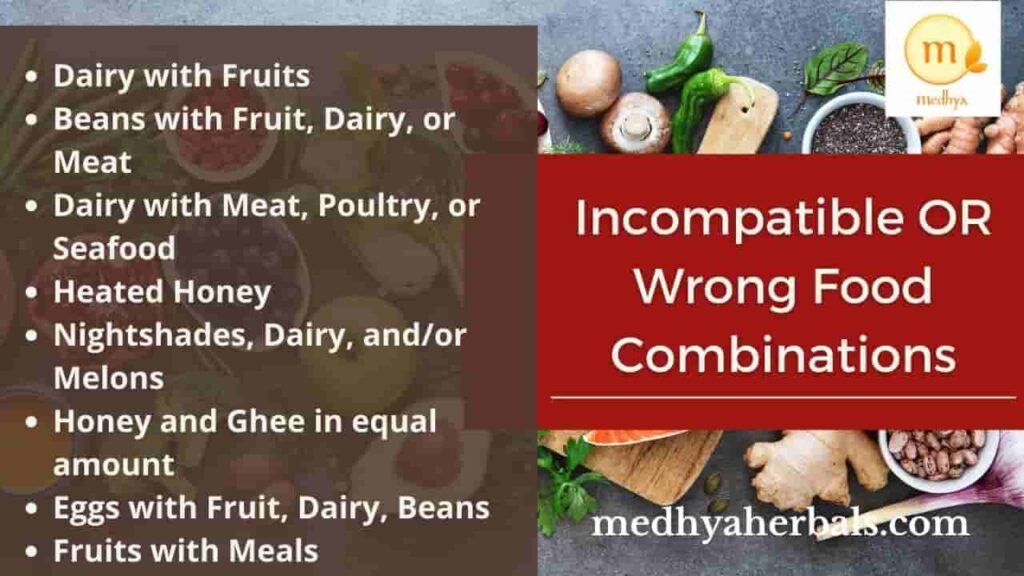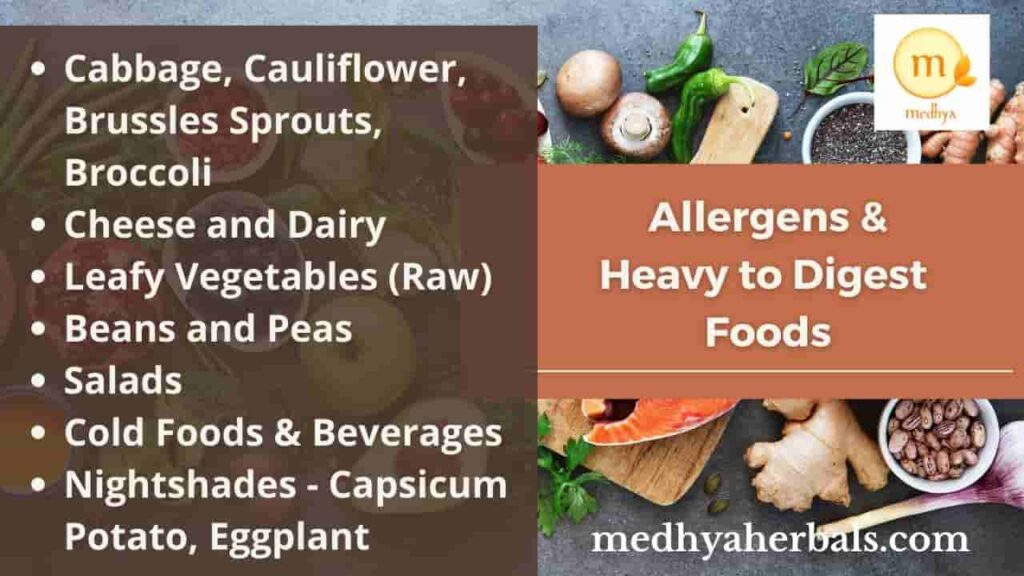The most effective bloating remedies in Ayurveda involve a generous use herbs as well as dietary and lifestyle changes. One of the primary causes of bloating is irregular movement or blockage of air in the abdominal cavity, leading to pain and swelling.
Bloating and excess gas production affects more than 70% of the population at physical and mental level. Extreme bloating can temporarily inflate or increase the size of the abdominal cavity to the extent that one may look overweight or pregnant.
In this post, we will look into Ayurvedic bloating remedies involving herbs, diet, lifestyle, and yoga poses that you can practice. We will also go through the causes of bloating and how to prevent bloated stomach at its root. Let’s check it out!

What causes Gas and Bloating?
In Ayurveda, bloating is considered to be an early stage of Vata Imbalance in the digestive tract. It is usually accompanied by poor digestive fire or “Manda agni” in the body.
Hence, bloating is essentially a health symptom which is arises from Vata Imbalance and poor digestive fire. And it is often accompanied by formation of “Ama” or digestive toxins in the later stages. Presence of “Ama” makes the situation more complex and difficult to treat.
Listed below are some of the common causes that aggravate Vata Dosha and slow down digestive fire, causing bloating and gas:
- Regular consumption of incompatible foods and processed foods that disturb digestive system
- Wrong dietary habits that slow down the digestive fire and build up toxins in the body
- Regular consumption of Vata increasing foods
- Holding off to natural urges such as urination, defecation, belching, sneezing, and passing of gas
- Irregular and inconsistent meal times and sleep cycle
- Parasitic infection
- Gut microbiome imbalances such as IBS, Ulcerative Colitis, or Candida infections.
- Eating too fast or while doing other things along with eating
- Swallowing gas by regular consumption of fluids through straw, or by breathing through mouth, or by excessive usage of chewing gums.

Ayurvedic View of Bloating and Gas
As we saw that bloating and excess gas production arise from improper movement of “Vata” or air through the digestive tract. In Ayurveda, we consider chronic bloated stomach to be a progression of digestive disorders.
Ayurveda defines that there are 4 stages in which a digestive disorder such as bloating and excess gas develops. If you take care of your diet and lifestyle in early stage, you can prevent this progression. However, if early intervention is not done, one may be prone to chronic digestive issues
In Ayurveda, abdominal distention due to gas is categorized into four parts:
- Aadhmana – Usual symptoms are flatulence with swelling/inflation of abdominal cavity
- Prati-aadhmana – Usual symptoms are accumulation of gas and or swelling of the upper abdomen only with feeling of discomfort. Pay may be present or absent.
- Aanaha – Usual symptoms are constipation and stomach distention due to obstruction of the excretory channels involving urine and the stool.
- Atopa – Usual symptoms are irregular gas movement and gurgling sounds in the abdomen. It is often accompanied by pain and lot of discomfort.
Ayurvedic Bloating Remedies that relieve stomach gas
Usually the solution for long term issues such as bloating and gas would involve a multi-fold approach with elimination of the common triggers as well as treatment that is specific to the individual’s health status.
According to Ayurvedic principles, Bloating and excessive gas can be managed by following a strict diet and lifestyle. An additional support of herbs will facilitate and speed up the recovery process.
Here is a list of Ayurvedic Bloating Remedies that will help you find relief from stomach gas for once and for all:
1. Ayurvedic Bloating Remedies – Removal of the Toxins
Ayurvedic Bloating Remedies involve a systematic approach towards first removal of the basic causes, which is toxin build-up in the digestive tract. Some of the common steps to take are:
- Do a full body cleanse. Required intensity of the cleanse would depend on your body type and your current health condition.
- Regular cleansing, specifically during season changes in spring, summer, and fall when one is prone to toxin build up in the body.
- Regular short cleanses on weekly or monthly basis.
- Intermittent Fasting to give your body time to cleanse and yet not disturb your daily schedule.
2. Nurture your Digestive Fire with Herbs and Spices
Increase intake of toning and digestive herbs such as ginger, turmeric, coriander, mint, thyme, basil, rosemary, black pepper, cumin, fennel, and carom seeds.
All of these herbs are pungent in taste and support the digestive fire. Some suggestions to consume herbs and
- Add the spices such as ginger, cumin, turmeric, and carom seeds to your veggies and curries.
- Chew Fennel Seeds after your meals.
- Chew a small piece of ginger with little rock salt if your digestion is particularly weak.
- Drink herbal teas throughout the day, specifically before the meals to ignite your digestive fire.
Benefits of adding Ayurvedic herbs and spices to your meals:
- These herbs improve your digestion.
- Prevent formation of gas and bloating.
- Provide micro nutrients and help in better assimilation of your food.
- Herbs and spices help to purge the gas outward. Hence, they ease out the pain from gas blockade.
- These herbs also promote weight loss and reduce the size of belly.
3. Diet and Foods to prevent Stomach Gas
One of the simplest approach is to remove the triggers that lead to the symptoms of bloating. For this, one needs to identify the specific food allergens that they are most sensitive to. Once, this process is complete, carefully eliminate the food allergens from your diet.
Some of the common steps to take are:

- Eliminate the common gas producing foods when the symptoms are severe. Such foods include cruciferous vegetables such as cauliflower, broccoli, cabbage, and radishes.
- Limit heavy and hard-to-digest proteins such as meat, cheese, curds, and beans, except mung beans, when you are suffering from excessive gas.
- Once your symptoms are in control, you can start with moderate intake of lean meats such as chicken and fish, and soaked, sprouted, and thoroughly cooked beans and lentils.
- Some of the common food allergens, specifically when you have toxin built up in the body are vegetables such as eggplant, tomatoes, potatoes, peppers, and okra. The reason being your gut lining becomes highly sensitive when you have toxins, hence you should carefully avoid them. However, once symptoms are in control, these are certainly super healthy foods to be included in the diet.
- Avoid heavy to digest dairy foods such as old cheese, sheep’s milk cheese, and buffalo mozzarella.
- Eliminate foods with a cold potency and cold temperature such as cold and frozen foods or drinks, and carbonated drinks.
4. Bloating Remedies – Ayurvedic Dietary Habits
Since the primary cause of Bloating is poor digestive fire, one needs to mindfully keep all the incompatible and unnatural foods away. Additionally, it is highly important to follow healthy dietary habits, that support the functioning of your digestive system.
In terms of food and lifestyle, one needs to follow a Vata pacifying diet and lifestyle. Some of the ground principles are:
- Fix your meal times and sleep timings. This is one of the primary steps towards balancing Vata Dosha.
- Take an early dinner that is light and easy to digest.
- Keep biggest meal of the day for the lunchtime and always take lunch between 12 – 2 Pm when your digestive fire is at its peak.
- Remove salty, stale, heavily processed foods, and ready cooked meals. Avoid, leftovers from the refrigerator or freezer.
- Always eat in a quiet setting with full focus on eating such that your digestive juices are secreted and proper digestion takes place. Avoid eating on the go.
- Always prefer seasonal and freshly cooked vegetables. Remove raw vegetables and salads from the diet.
- Take warm, unctuous, and lightly cooked meals in the form of steamed and stir-fried preparations.
- Avoid grazing and overeating as both of these processes poorly impact our digestive fire, hence triggering bloating symptoms.

5. Practice Ayurvedic Lifestyle
- Fix sleep timings and always take 7-8 hours sleep in between 10 PM to 6 AM. Good sleep promotes digestion and detoxification processes of our bodies.
- Practice regular self-massage by warming oils such as sesame oil and ghee. In Ayurveda, it is known as Abhyanga. It promotes circulation and flow of air and fluids in proper direction.
- Practice Anuloma Viloma Pranayama or alternate nostril breathing for 10-15 mins on daily basis. It should be done early in the morning and before sleeping, but never after food intake. It stimulates flow of air in the proper direction.
- Do light and relaxing physical activity such as walking, jogging, swimming, yoga, dancing, and tai chi etc. This will help to provide adequate pressure to right points in the abdominal cavity and rid of excess gas.
6. Fluids, Hydration, and Beverages
- Avoid excessive fluid intake before, during, and after the meals as it slows down your digestion, thus producing gas.
- Ayurvedic dietary guidelines suggest few sips of warm water along with the meals to promote movement of the food through the digestive tract. One should aim for overall less than 1/2 cup of water or herbal tea before food, while eating, and up to two hours post meal.
- Sip on hot water between meals.
- Avoid cold beverages, water, and juices (both hot and cold) with your meals.
- Remove caffeine and alcohol as both are dehydrating in nature, thus leading to Vata Imbalance.
7. Go for a short walk after meals
Going for a short walk after meals is a great way to prevent build up of gas, promote digestion, and also relieve any gas blockade.
Make sure that you are not carrying out strenuous activity after your meals. It will aggravate the problem instead. Always avoid, lying on your belly, jumping, or any kind of excessive movement right after food intake.
On the other hand, light stroll relaxes your mind to assist with the digestive process, secretion of digestive juices in the GI tract, and also movement of the food downward.
8. Get into Gas Relieving Yoga Poses for Relief
Gas relieving poses and yoga asanas promote movement of the “Apana Vayu” in the downward direction. They release the gas blockade, which is often caused by Vata Imbalance. They should be practiced regularly after meals to support your health and prevent bloating after meals.
However, you do need to make necessary changes in your diet and lifestyle to find a complete relief. So, take yoga asana as to be an additional measure that can support your health in the short term. But, for long term, you have to be mindful and take a disciplined approach to prevent gas formation for good.
So, here are the yoga asana that you can practice:
- Vajrasana
- Balasana
- Pawanmuktasana
- Paschimottanasana
- Marjariasana
- Uttanasana
- Ardha Matsyendrasana
Now we would like to hear from you. Have you tried any of the above bloating remedies or Ayurvedic tips to relieve bloated stomach? What worked for you and what was your experience? Do let us in the comments below.
Or if you have any queries. Ping us here and we’ll get back the soonest. Wishing you vibrant health!
References


From few days I am experiencing a tight stretch like feeling just below my chest & diaphragm. As if something is obstructing in that area. The tight swelling like sensation a kind of stretch even extends towards the both sides of my abdomen. I can’t understand why I am feeling like that. After eating or while sitting in a couched or bend position even while standing I feel it more as if a gas filled tight air sac is placed below my diaphragm and both sides of my abdomen. A sort of internal inflammation .I can sense it. Near my liver and gall bladder and towards both kidneys.
Hello! This is likely a case of Prati-aadhama, where gas is trapped in the upper abdominal area, leading to pain and swelling. To better understand the causes of the problem, please help to answer following questions.
1. Is there any constipation, feeling of nausea after meals?
2. How is your appetite?
3. Is there any feeling of burning micturition, or dysuria?
4. Is some pain radiating towards the backward?
5. Do you get relief after release of gas?
You can either answer these questions by sending email to health@medhyaherbals.com or you can fill in the Health Quiz, which is a symptoms based health assessment to understand the underlying causes of your health problems.
Here is the link to the health quiz: https://medhyaherbals.com/medhya-health-quiz/